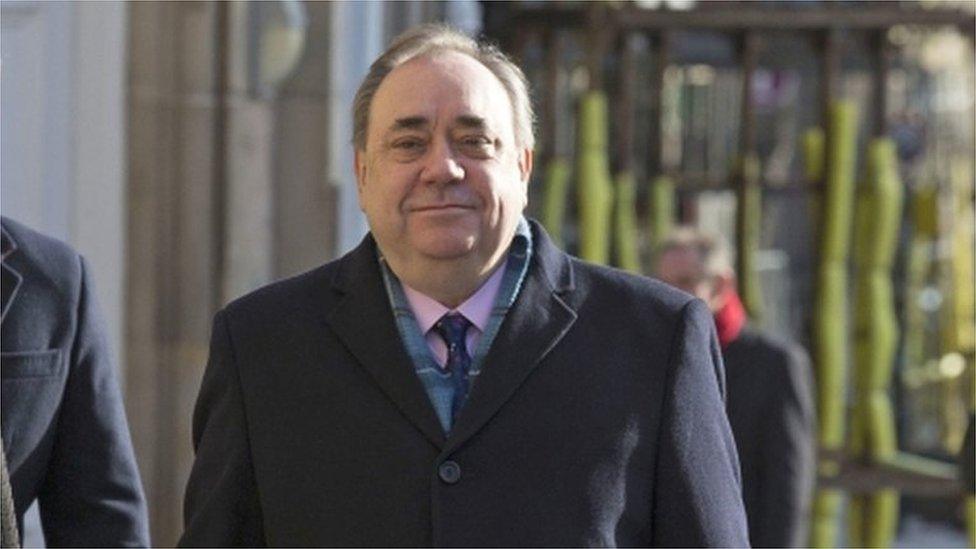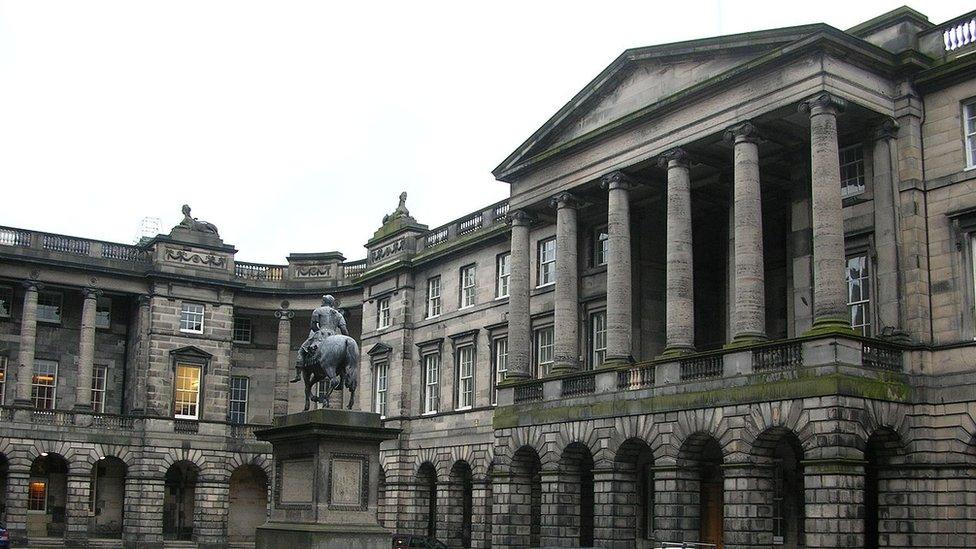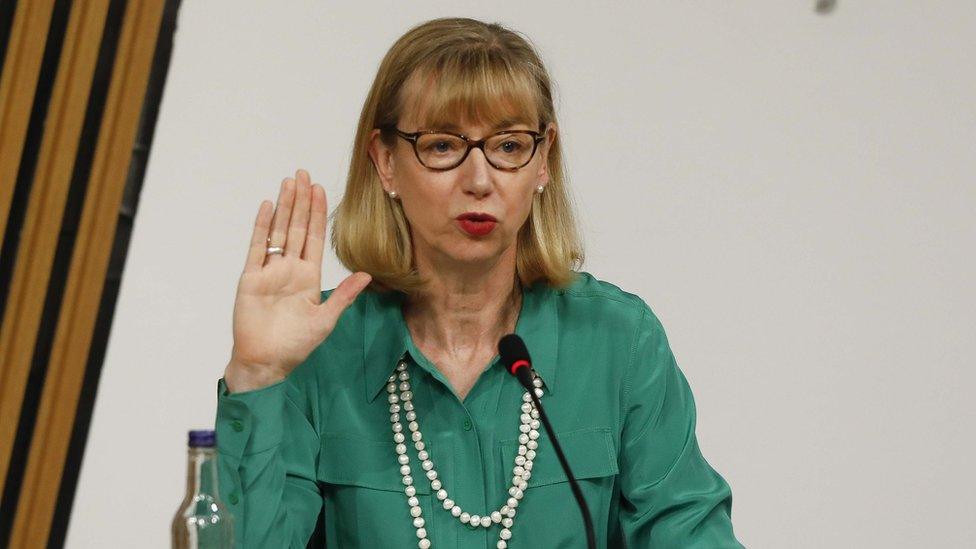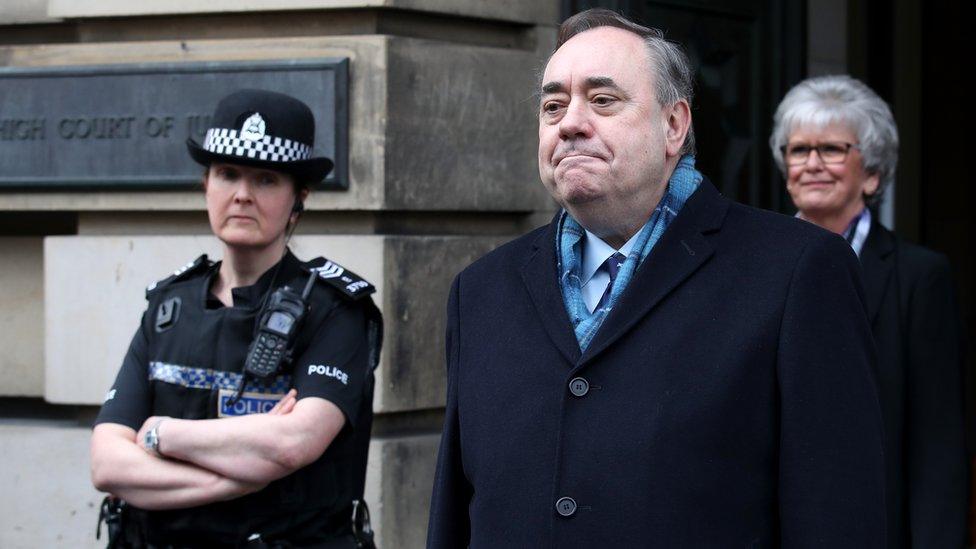Alex Salmond 'could go to court' over inquiry papers
- Published

Mr Salmond has previously won a legal battle against the Scottish government and been cleared of all charges by a criminal court
Alex Salmond could go to court to force the release of documents to a Holyrood inquiry into the Scottish government's investigation of him.
MSPs are holding an inquiry into the botched handling of harassment claims against the former first minister.
The committee has complained that the government has provided a "very limited" range of documents about its legal battle with Mr Salmond.
Mr Salmond's lawyers now say they could ask a court to release more documents.
In a letter to the committee, they say they could see "no reason at all" why ministers could not release papers relating to a judicial review at the Court of Session of its handling of the complaints.
The government admitted on the eve of the review in January last year that it had acted unlawfully, and was left having to pay Mr Salmond's £500,000 legal fees.
Deputy First Minister John Swinney has said the government will give a "full account of its legal position at different points in time" to the committee.
But he said it would not be waiving its privilege to withhold documents containing confidential legal advice.
Mr Salmond's lawyer, David McKie, claimed that the Scottish government "continues to delay and to provide partial and incomplete evidence".
He said that this pattern was "familiar to us from the judicial review proceedings".
'Return to court'
Mr McKie said the "quickest and cheapest" route would be for Mr Salmond to provide the committee with a full list of relevant documents, so it can then ask the government for each one.
He added: "The second option, which we are willing to undertake on behalf of the committee, would be for Mr Salmond to return to court to seek the express consent of the court to have those documents passed to the committee."
However, Mr McKie said the committee would first need to confirm that it would cover Mr Salmond's legal costs.
He went on to say: "We would reinforce that we do not understand why an offer to produce these documents has not been offered in full by the Scottish government, whose documents they are.
"They are in a different position from our client in that the documents belong to, and originated from, the Scottish government."

Mr Salmond is "willing" to return to the Court of Session to force the publication of key documents
Mr McKie also said legal papers pertaining to the criminal trial of Mr Salmond - which saw him acquitted of 13 charges of sexual assault earlier this year - should be handed over.
The Scottish government has insisted that it is co-operating with the inquiry, but has argued that it does not have to hand over all the documents that the committee wants.
Mr Swinney wrote to members saying that "it is important that ministers and officials can seek legal advice whenever they need to" so that lawyers could provide "full and frank" advice in the knowledge that it would not be made public.
He said handing over the papers would "undermine this ability on future occasions when ministers and officials choose to seek legal advice", which would "not be in the interests of good government and the upholding of the rule of law".
'The truth must out'
Lord Advocate James Wolffe echoed this defence in the committee's latest meeting, but told members that the government was "proactively considering steps to allow access to relevant court documents".
However, members voiced displeasure with the refusal to waive privilege, with deputy convener Margaret Mitchell saying "it seems to me the public interest is being denied the accountability it should have".
And Labour MSP Jackie Baillie said the "explosive" letter from Mr Salmond's lawyers "reveals the extent of the Scottish government's failure to be fully transparent with the committee and the public".
She added: "The continued evasion is undignified, undemocratic and simply unacceptable. The secrecy must end - the truth must out."

Leslie Evans said a text message she sent had been "misinterpreted" as being about Mr Salmond
At the same meeting, Permanent Secretary Leslie Evans - the Scottish government's top civil servant - denied being "at war with Alex Salmond".
She accepted she had sent a text message saying "we lost the battle but will win the war" following the concession of the judicial review, but said this had been "misinterpreted as having some kind of conspiratorial element to it".
The permanent secretary said she was actually referring to her "long-term commitment" to ensure that the government was a "more inclusive" work environment with "equality at the heart of what it does".
She also said "there was no fishing expedition" to try to drum up complaints against Mr Salmond, saying it would "go against everything in the DNA of a professional HR person" to do this.
At the judicial review, the government accepted that contact between the HR officer investigating Mr Salmond and the women who made the complaints could have created the impression of bias.
However, Ms Evans told MSPs that "the basis for the concession was the acceptance of apparent bias, not actual bias", adding: "The Scottish government did not, and does not, accept any suggestion that the investigating officer acted in a partial way or that the investigation or the decision reached were partial.
"At all times those involved in the procedure acted in good faith."
- Published18 August 2020
